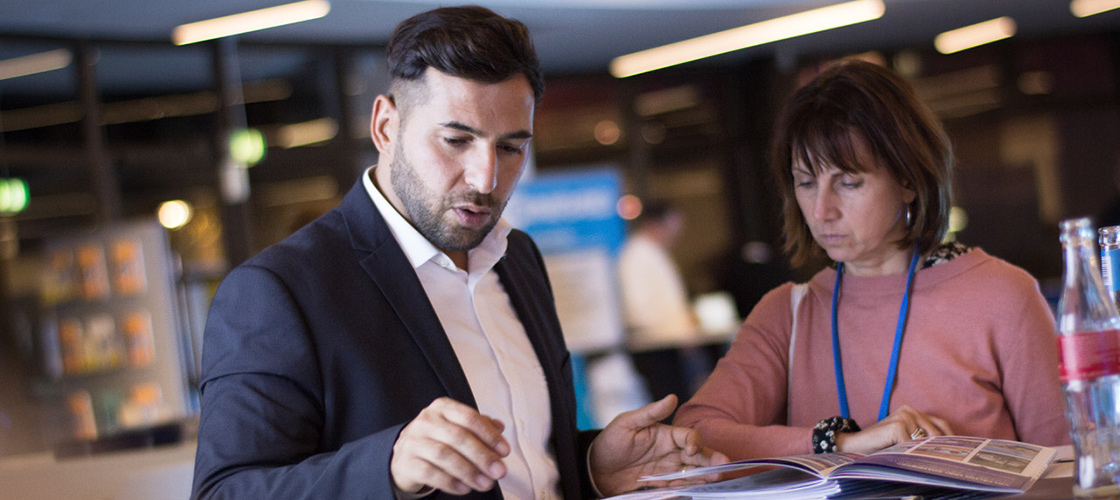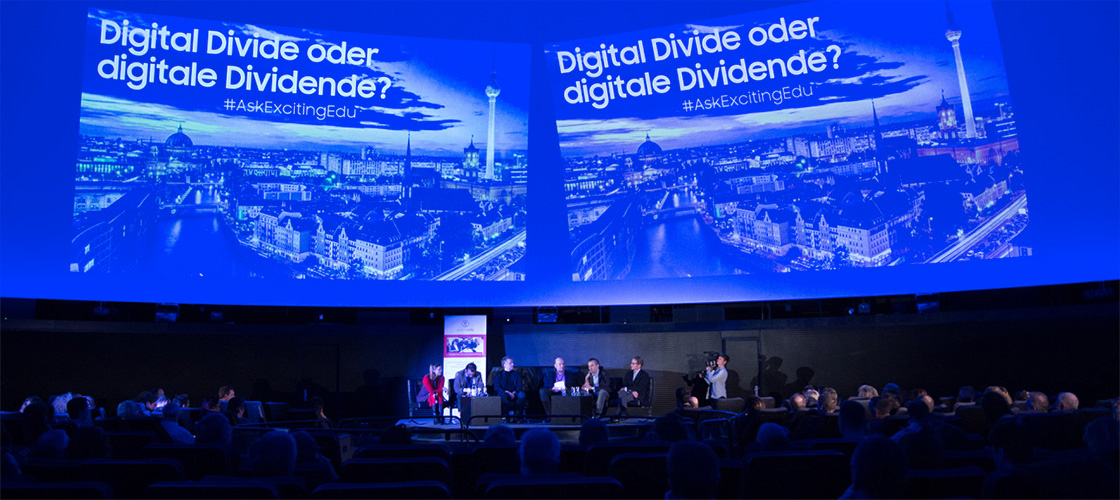
#excitingEDU – The digital school of tomorrow
What if?
Pupil Max, 9 years old, sits at the iPad in the afternoon and eagerly learns fractions with a maths app. When he has questions, he clicks on the little mouse Franky, which helps him playfully. The next morning Max meets his class 3b and teacher Mrs Schmidt in the classroom, where he and his classmates practice and apply fractions. The whole thing, of course, is guided by Mrs Schmidt on the digital whiteboard by supporting the app and mouse Franky.
Digitisation is currently changing our learning behaviour and that of our children. It almost goes without saying that this development also affects our educational institutions. Learning will be digital, entertaining and freer than ever before, is the hope.
At #excitingEDU Lehrerkongress is precisely this form of education - digital and future-oriented. The project developed by the Klett MINT GmbH initiated for the third time, which is aimed specifically at teachers of all types of schools, connects people in the field of "digital education". In the meantime, the annual congress has become the leading German-language conference for anyone who wants to play a decisive role in shaping digitisation in schools in the coming years. The conference, which is held jointly with the Full Moon Kids – Special Agency for Education and Marketing for Children, Youth and Families - brought together 350 teachers of all subjects with representatives of educational authorities, school boards, technology providers and educational research at the end of November. This year, everything again revolved around the topic "Good teaching with digital tools".
As in the previous year, the cooperation partner Stiftung Planetarien Berlin the Zeiss-Großplanetarium at Prenzlauer Berg and projected a spectacular Twitter sky with countless tweets to the star dome. For hours the hashtag #excitingEDU ranked second in the Twitter charts. This shows how burning the topic is for the German educational landscape.
Opportunities and barriers to education 4.0
It all began at the Teachers' Congress with a panel discussion and one question: Digital Divide or Digital Dividend - How must schools respond to the challenges and opportunities of digitisation? Dr. David Klett (Managing Director of Klett Learning and Information and Klett MINT), Thomas Jarzombek (MdB CDU, spokesperson of the CDU/CSU parliamentary group for the Digital Agenda), Anke Domscheit-Berg (non-party MdB on the list Die Linke), Thomas Zapf (teacher) and Steffen Ganders (Director Corporate Affairs Samsung) agreed on the panel that digitisation is still progressing too slowly. According to Zapf, one way for schools to obtain third-party funding for special technologies such as 3D printers would be to use them. Such devices are not a must, according to Zapf, but a good addition. Klett confirmed the need for digital media and terminals for modern education. In this respect, he said terminal manufacturers had a crucial role to play.
However, the parties involved are still divided on the subject of "cooperation prohibition": While Domscheit-Berg spoke out in favour of abolishing the cooperation prohibition in order to reduce the investment backlog in the education sector, Jarzombek confirmed the prohibition, as it ensures that funds are used where they are really needed. He underlined that this was a problem at state level, as uniform IT standards were currently still lacking. However, Klett himself warned against too many content specifications. Which digital media and content should be used must be decided by those who are affected and know best: The teachers.
Innovative methods for digital teaching
In addition to the panel discussion, the participants exchanged views on solutions suitable for everyday use in 35 thematic talks and six practical workshops.
The scenario of the school of tomorrow, in which Max experiences digital and thus self-determined knowledge and consolidates this together with his teacher and fellow pupils, is taking shape more and more. The keywords are digital whiteboards, flipped classrooms, where the sovereignty over information no longer lies with the school alone and collegial exchange moves to the centre of the classroom, or gamification, where game mechanics are built into a "non-game" context. Suddenly, units of measurement in mathematics lessons are no longer "only" learned by heart, but are applied in a playful way. In this way, the school building is measured out by the pupils themselves and reconstructed to scale, whereby the topic of "units of measurement" is actively implemented and internalised.
In addition, between the lectures and discussion rounds, the congress visitors tested self-programmable robots, WLAN hotspots and VR glasses, learned about digital initiatives such as the HABA Digital Workshop or Mathehappen e.K. or got to know new learning apps such as the lesson planner Trello or the digital vocabulary trainer from PONS.
Digital learning: from vision to realisation
The fact that learning is already digitally possible today and can bring a lot of joy to children, pupils and students could hardly be better illustrated in any other place than the Zeiss Large Planetarium. Planetarium boss Tim Florian Horn demonstrated at the "Science Theatre" how modern and breathtakingly modern scientific knowledge can be conveyed through digital technology. Thanks to a fulldome projection, several video projectors connected together projected a high-resolution image onto the dome of the planetarium. The spectators experienced the feeling of really flying into the galaxy, suddenly being very close to the stars as well as still unknown places and experiencing astronomy live.
However, digital education is still in its infancy. The #excitingEDU Teachers' Congress, which connects and brings together all participants, ensures that these shoes can grow. Vision is gradually becoming reality and digital leisure time is slowly turning into digital everyday life on all levels of society. This is how Max is still learning with pen and paper today. But it is only a matter of time before he leaves his notebook in his backpack, takes out his iPad instead and learns fractions with App & Co. together with mouse Franky.
